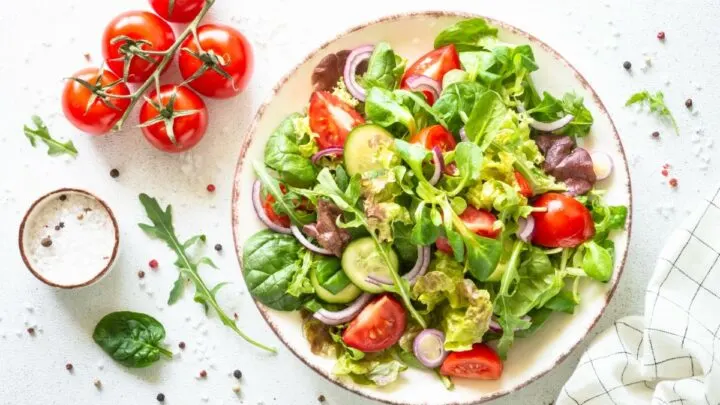When people are eating food, they need to keep a lot of things in mind. Portion size is one of these things.
It’s important because portion size helps you figure out how much you want to eat. You never want to undereat or overeat because both can lead to snacking, which in turn, causes excessive weight gain.
You can fix this problem by learning the correct portion size for the meals you are preparing.
One food people do this with is meals like salads and in this article, you’ll learn what it is, how much to give each person if you can eat too much, and the benefits of eating it.
Contents
How Much Salad Does Each Person Get?
Salads are a great thing because they just don’t have to be a traditional salad that includes lettuce, cucumber, tomato, etc.
You can have fruit salad, macaroni salad, seafood salad, and potato salad to name a few options.
Whatever salad you have, there is a general amount everyone should get. It’s recommended that every person attending the meal should get around three ounces. So, multiply that time by whoever is attending your meal.
If you happen to be the only one eating, then feel free to make more than three ounces worth of salad because then you have leftovers.
Overall, traditional salads are considered to be one of the healthier foods out there. The same goes for fruit salads, but this is if you are having it in moderation.
There is such a thing as too much of a good thing and as healthy as salads are, if you are eating them every day then you are going to have some issues.
Can You Eat Too Much Salad?
People may choose to have a salad for a variety of reasons but depending on what you put in it, it could be causing you some physical issues.
- A big issue with salads, while not serious, is extremely uncomfortable. Eating a lot of salads can give you excessive gas, bloating, and just general gastrointestinal issues. The reason for this is that a lot of greens, leafy greens especially, have a decent amount of fiber. A good way to circumnavigate this is by trying to limit the types of vegetables you are putting in the salad. Mix it up, and don’t always go straight for the leafy greens.
- Another issue with eating salads has to do with those prepackaged lettuce bags you might find in the grocery store. What can happen is bacteria such as E.coli listeria, norovirus, salmonella, and Cyclospora can get trapped inside there. If you ingest one of these bacteria and it gets into your system, then it could wreak havoc on your body. Over the years, there have been many bacteria outbreaks in prepackaged lettuce, so you do need to be aware of the risks of eating this.
- Don’t think that raw lettuce and other vegetables are safe either. These could also have bacteria on them. A way to keep yourself safe is to thoroughly wash the vegetable or whatever raw food you are putting in your salad. It will not eliminate the risk, but it does help lower your chances of getting bacteria into your system.
So, these are the biggest issues with eating salad. The majority of them are not necessarily serious.
This is especially true with the bloating and the gas. It’s more uncomfortable and might cause you to drop everything and rush straight to the bathroom.
However, despite the risks, you’ll be happy to know that there are a lot of benefits that come with eating salad.
What Are the Benefits of Eating Salad?
One common food in salads is leafy greens or other greens such as lettuce, cabbage, cucumber, pepper, kale, spinach, etc.
They are particularly good for your body and over health.
- A big benefit of salads is that the greens in them have a lot of fiber. Fiber not only helps you with your gastrointestinal health, but it also is great for your cardiovascular health. Plus, if you are trying to lose weight this is a great food to add to your diet because it doesn’t pack on calories.
- Some of the green foods that are put in salads have a lot of vitamins such as vitamins A, C, K, and B. Overall, vitamins help your immune system and can assist in healing wounds. Also, they give you the energy you need to function. Depending on the vitamin, you are going to get specific benefits unique to that vitamin. The main consensus is that they are good at boosting your health in general.
- Finally, another benefit of eating salads is that some green foods can contain potassium in them. Potassium is a great thing to put into your body because it helps with blood sugar, blood pressure, bone health, your nervous system, and finally your cardiovascular health. Some of these may need some more research, but the fact that it’s even possibly makes potassium quite impressive.
Here we have the biggest benefits of eating salads. As long as you are eating it in moderation and mixing up the vegetables you are adding to the salad, you can increase your chances of getting these benefits.
If you want to overindulge every now and then that’s fine. Hey, we all do it once in a while! We are only human.
Final Thoughts
And there you go all your salad lovers out there! If you decide to make a salad, then you know how much portion size to give out to people.
Salads are an extremely healthy type of food. Of course, they can be made unhealthy based on how much dressing you use and the extra ingredients, but overall, it’s healthy.
Despite this, you do need to keep portion size in mind. There is such a thing as doing and eating things in moderation.
Overindulging in things is okay now and then but you don’t want to make a habit of it.
You might also be interested in the following:
- How Much Potato Salad per Person?
- How Much Mashed Potatoes per Person?
- How Much Coleslaw per Person?

I have been smoking and grilling meat from an early age and enjoy sharing my knowledge and expertise through the hundreds of articles I have written about BBQ. I hope to make everyone’s BBQ journey that little bit easier.

